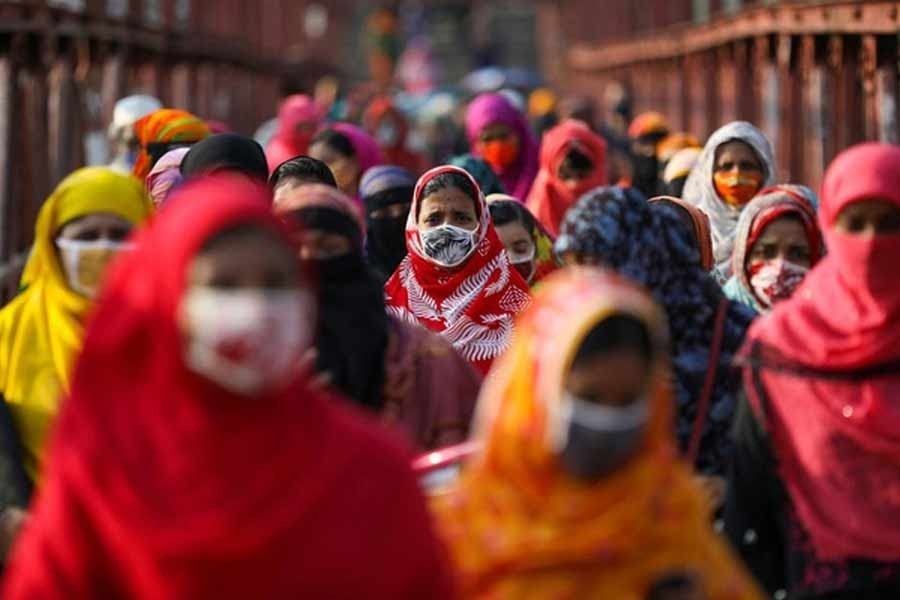
Published :
Updated :

Bushra, an 11-year-old girl from a place near Idlib city in Syria, represents an 'entire generation of children' who, CNN says, 'have been forced to grow up with the conflict dictating their lives'. The number of children born in that war zone since 2011, according to 2020 Unicef data, is almost five million.
Similar horrifying memories of Bangladesh's 1971 bloody war of independence and earlier bloodsheds in the subcontinent are increasingly becoming a matter of history with departure of contemporary generations. Despite widespread media coverage, dominant global powers have shown indifference to the victims of the recent and ongoing civil wars in the West Asia (Middle East) and North Africa that killed thousands and uprooted millions.
However, the worldwide outbreak of coronavirus has made the entire generation on earth today a hostage for over a year with no end in sight. The optimism offered by development of vaccines has now been dwindled by resurgence of Covid-19.
Alongside death, infections and economic fallouts, the pandemic has created depression in life, adversely affecting immediate society and global environment in the age of virtual connectivity. Governments, international organisations, non-government organisations and businesses as well as resilient people have technically done their best to cope with the situation. For the sake of restoring livelihoods, many of the activities, too, have resumed almost everywhere as it has done in Bangladesh.
Still, 'feel good' or 'business as usual' condition is yet to return to life. What over-enthusiasts call 'new normal' is not any normalcy in reality, given the awkward feeling people have while moving out of homes. Many try to escape the situation, ignore the pictures all around and visualise a world free from trauma but the fear and discomfort can't yet be removed from their mind.
Physicians, psychologists, and researchers are also trying their best to develop newer solutions to the once-in-a-century crisis.
Somehow, the narratives for and approaches to redressing the people's frustration amid a prolonged crisis are yet to prove effective.
Pundits forecast the pandemic is going to change old orders and cultures but who believe in changes or are ready to make themselves ready for such changes?
The pandemic has produced a few beneficiaries as well, although most people are struggling for existence. Simultaneously, there is a sense of complacency among some, thanks to new survival strategies and functioning of supply chains.
Thus, clever forces foresee there may be a bubble growth or certain scope for windfall profit once the crisis is over, an assumption which is based on conventional experiences until the pandemic.
Unfortunately, some of the weaknesses and drawbacks exposed by the pandemic are not being studied seriously.
In Bangladesh context, education services, among other issues, can't be provided to all, especially the poor, during the crisis. The youth are a major casualty in view of lost opportunities and future uncertainties,
Global cooperation is missing whereas economic (and even vaccine) nationalism has led leaders of powerful nations to pursue their policies on parochial lines.
The peoples are deprived of human touch that is required for addressing any crisis with collective strength. A masked man doesn't look to be a man of warm heart.
The political world has failed to hold a discourse of international order that is so essential for working out solutions to the ongoing crisis and post-pandemic challenges.
If the virus remerges with different variants in the coming days and months, it's hard to say exactly when the world would be completely free from Covid-19. Already tired of the pandemic and its effects, people may be further depressed in absence of real hopes.
Natural disasters remind us that we are social beings and it's any 'I' as an individual who needs the empathy of family, friends and society that others, too, need. We don't know if the altruism shown by some during the initial months of the pandemic would be there in case it takes more time to see off the crisis. The fate of the children in Syria makes us sceptic about any possibility for others living elsewhere to see a world they dream of.
khawaza@gmail.com


 For all latest news, follow The Financial Express Google News channel.
For all latest news, follow The Financial Express Google News channel.